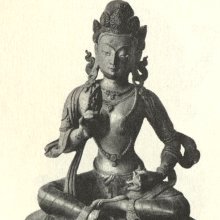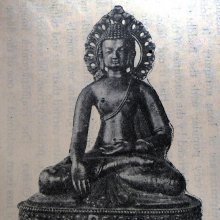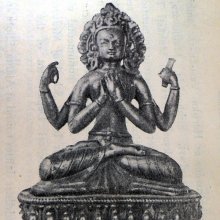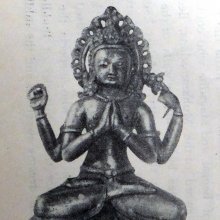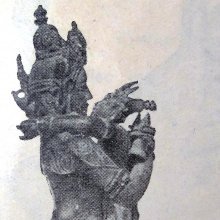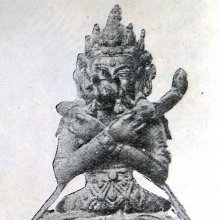Vajracarya, Vajrācārya, Vajra-acarya: 3 definitions
Introduction:
Vajracarya means something in Buddhism, Pali, Hinduism, Sanskrit. If you want to know the exact meaning, history, etymology or English translation of this term then check out the descriptions on this page. Add your comment or reference to a book if you want to contribute to this summary article.
Alternative spellings of this word include Vajracharya.
Images (photo gallery)
(+2 more images available)
In Buddhism
General definition (in Buddhism)
Source: WikiPedia: BuddhismVajrācārya (वज्राचार्य), lit. “vajra acharya (guru or master)”, is a Vajrayana Buddhist priest among the Newar communities of Nepal and a Revered Teacher who is highly attained in Vajrayana practices and rituals. Vajracharya means “vajra carrier”. They are also commonly called guru-ju or gu-bhaju (a short form for guru bhaju) which are Nepali terms related to the Sanskrit term guru, and translate as “teacher” or “priest”.
Languages of India and abroad
Sanskrit dictionary
Source: Cologne Digital Sanskrit Dictionaries: Monier-Williams Sanskrit-English DictionaryVajrācārya (वज्राचार्य):—[from vajra > vaj] m. Name of a preceptor, [Buddhist literature]
[Sanskrit to German]
Sanskrit, also spelled संस्कृतम् (saṃskṛtam), is an ancient language of India commonly seen as the grandmother of the Indo-European language family (even English!). Closely allied with Prakrit and Pali, Sanskrit is more exhaustive in both grammar and terms and has the most extensive collection of literature in the world, greatly surpassing its sister-languages Greek and Latin.
See also (Relevant definitions)
Partial matches: Vajra, Acarya.
Full-text: Lilavajra, Shridhara, Krishnasamayavajra, Bodhibhadra, Kamalarakshita, Bhavabhadra, Bhavabhatta, Tathagatarakshita, Durjayacandra, Abhayakaragupta, Jayabhadra, Bhavyakirti.
Relevant text
Search found 4 books and stories containing Vajracarya, Vajrācārya, Vajra-acarya, Vajra-ācārya; (plurals include: Vajracaryas, Vajrācāryas, acaryas, ācāryas). You can also click to the full overview containing English textual excerpts. Below are direct links for the most relevant articles:
The Indian Buddhist Iconography (by Benoytosh Bhattachacharyya)
Figure 10 - Buddhist Triad (2): Buddha
Figure 11 - Buddhist Triad (3): Saṅgha
Guhyagarbha Tantra (with Commentary) (by Gyurme Dorje)
Text 13.1 (Commentary) < [Chapter 13 (Text and Commentary)]
Text 13.4 (Commentary) < [Chapter 13 (Text and Commentary)]
Introduction 3.2.1: The preparatory ritual for the student’s entry < [Chapter 9 (Text And Commentary)]
Blue Annals (deb-ther sngon-po) (by George N. Roerich)
Chapter 2 - The Great Translator Rinchen Zangpo < [Book 2 - Later spread of the Doctrine]
Bodhisattvacharyavatara (by Andreas Kretschmar)
Related products
